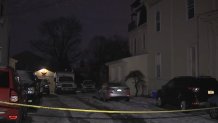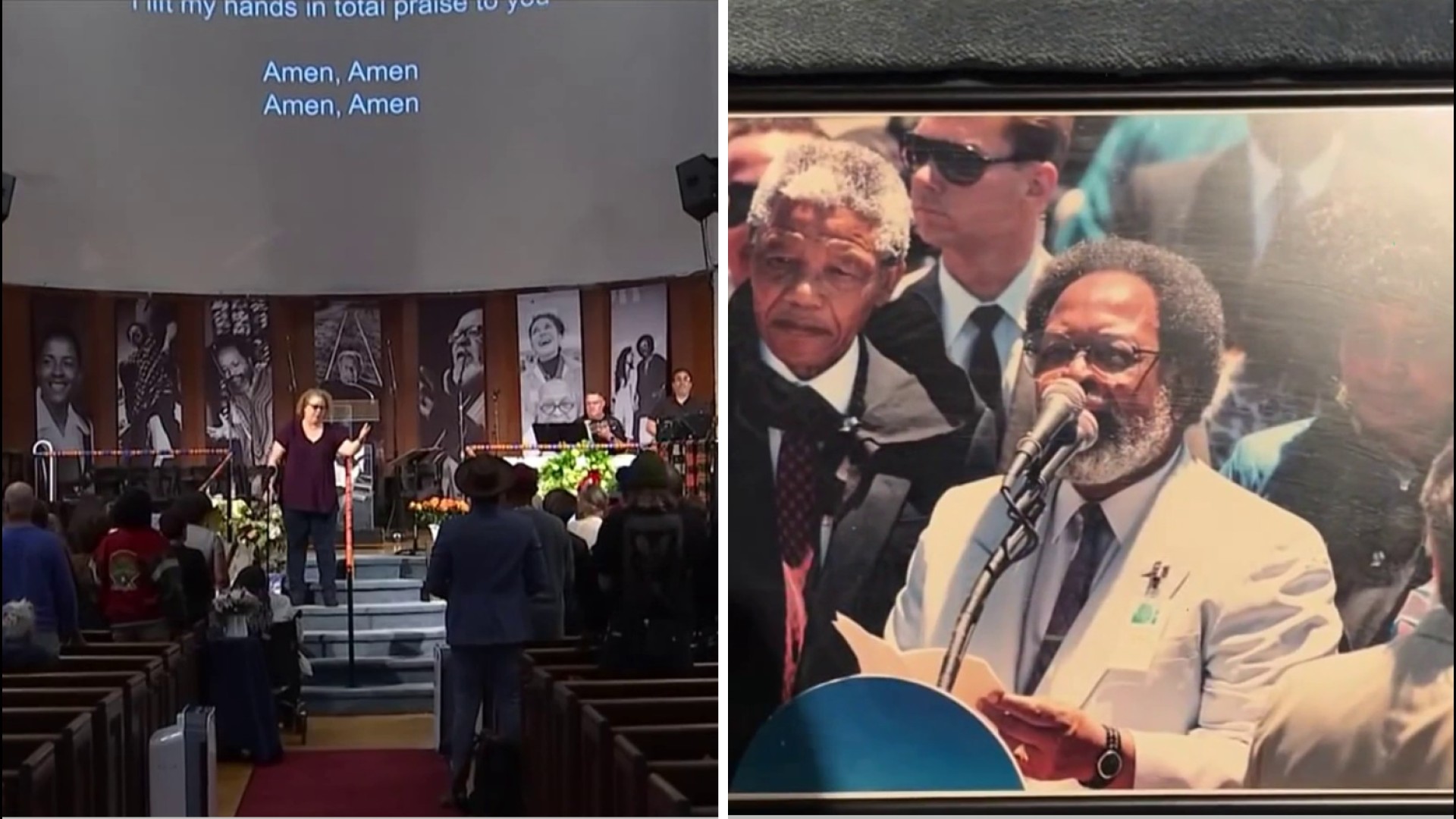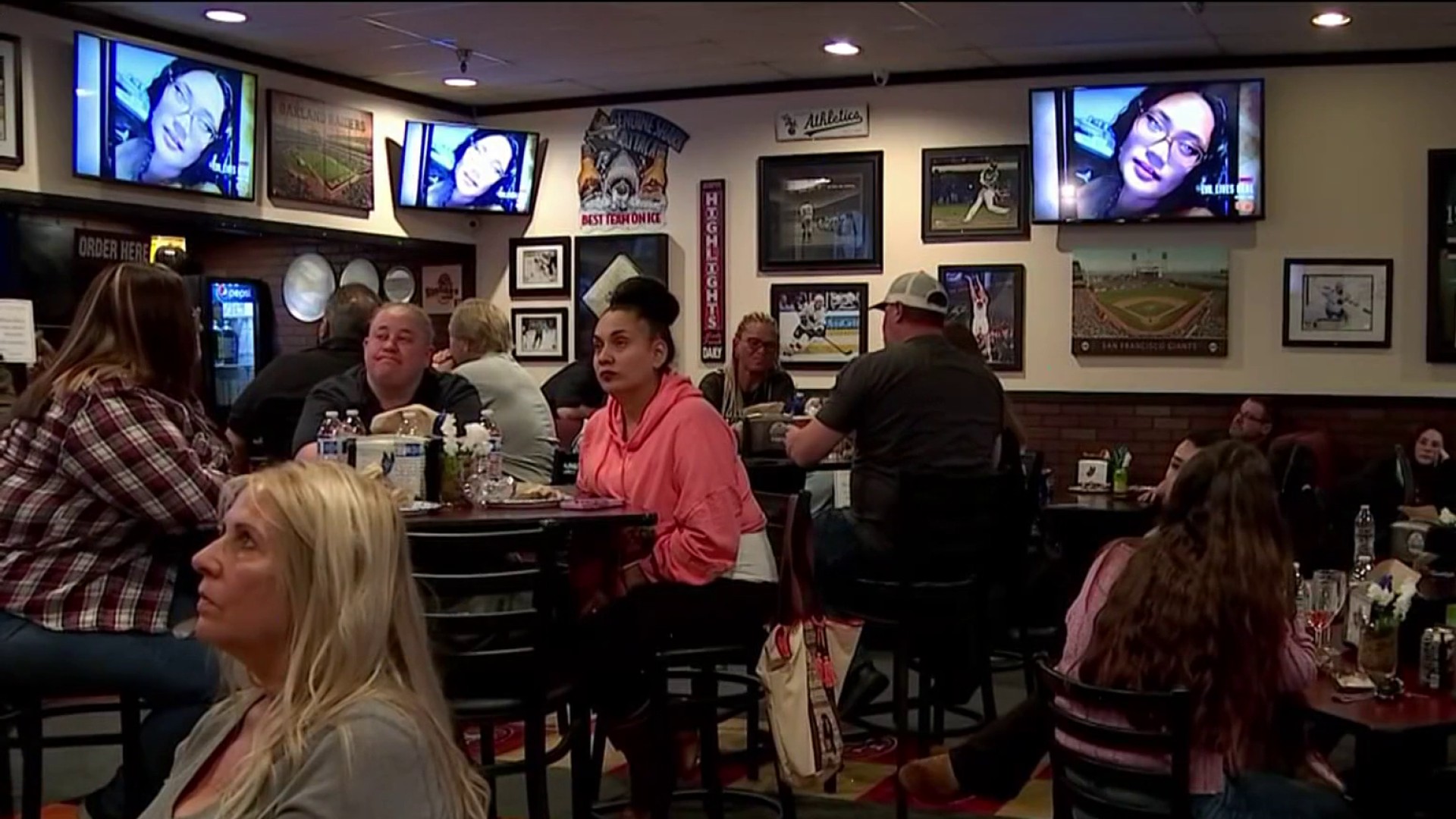Tenants of a West Oakland triplex are running a surveillance operation on their landlord and say they have used hidden cameras to record more than 3,000 hours of video in a desperate attempt to prove they are being wrongfully evicted from their rent-controlled home.
“You have to collect the evidence yourself,” said April Thomas, who lives in one of the building’s three units with her husband Ben Allen. “You have to become your own private eye to prove that your landlord doesn’t live where they say they do.”
According to Oakland’s “just cause” ordinance, tenants may only be evicted for certain reasons, such as failing to pay rent and repeatedly violating provisions of their lease. However, a little-known Oakland law exempts owner-occupied duplexes and triplexes from those eviction protections, meaning landlords are legally allowed to evict tenants of a duplex or triplex without cause, as long as the landlord lives in the building.

'Our Landlord Doesn’t Live Here'
Thomas and Allen, as well as a family of four that also live in the triplex, allege their landlord doesn’t actually live in their building. Instead, they argue, the landlord is merely pretending to live there in order to exploit the city’s housing laws.
“Our landlord doesn’t live here,” Thomas said. “He never lived here. He didn’t live here on the day he gave the eviction notice, but about a week after he delivered the eviction notice, he started coming here once or twice a week.”

Landlord Denies Allegations, Defends Eviction
Local
The owner of the building, Donald Woodard Jr., denies the accusations from his tenants.
“They can think whatever, but I've been in this house,” Woodard said.
The NBC Bay Area Investigative Unit caught up with Woodard at his triplex after the landlord did not respond to requests for an on-camera interview.
Woodard explained he moved into the triplex to be closer to his ailing father and because of marital issues between him and his wife.
“Me and my wife are going through some things right now,” he said.
Thomas says she doesn’t believe Woodard and his wife are actually going through marital issues and points to the wife’s public Facebook page as evidence.
In September, more than two months after the tenants received their first eviction notice, Woodard’s wife described him on Facebook as someone “I live with” and joked about who’s washing the dishes at home.
Another video on the page, posted weeks after the eviction notice was served, shows the couple together at a home that is clearly not the West Oakland triplex.
As for his ill father, Woodard said he simply needed to live closer so he could help take care of him.
“Where I was living before, it’s pretty far,” Woodard said. “I need to be closer to him.”
Driving from the triplex to his father’s house in Berkeley is only about five miles closer than driving there from the other Oakland home he owns. Thomas said it doesn’t seem plausible that Woodard would uproot his entire life over a difference of five miles.
Woodard’s family issues may explain why he decided to move into the triplex, but they don’t explain why he is evicting the building’s tenants. When asked why he was doing so, he didn’t offer an explanation.
“Right now, I have no clue,” Woodard said. “Right now, I only know what’s going on with me and my family – what’s happening with me and my wife at the moment.”
And though Woodard said he “believed” he was living at the triplex when he served his tenants with their first eviction notice, he said he could not be sure.
“It’s been so much going on back with work and trying to get to dad and all this other stuff going on,” Woodard said. “I believe I was, but at the end of the day, I can’t confirm anything right now.”
While Woodard claims he no longer lives with his wife, the NBC Bay Area Investigative Unit recorded video of Woodard or his car at that home three days in a row. Woodard was even recorded wheeling garbage cans from the curb back into the home.
“If we get evicted from this place, we’ll have to leave the Bay Area,” said Allen, a graduate student who hopes to eventually teach at a community college in Oakland. “It’s going to be kind of awful.”
Thomas, Allen’s wife, works for a nonprofit. The couple pays $1,060 per month for their one-bedroom home. If evicted, they say they’ll likely be unable to afford to stay in Oakland, where rent prices have increased nearly 20 percent in just the past three years.
The couple’s neighbors, a family of four, moved into the rent-controlled triplex 10 years ago. They did not want to be identified in this story but told NBC Bay Area that Woodard never lived at the triplex and is only now pretending to do so in order to evict them.
“A lot of other tenants, including the other tenants in this complex, if they get evicted, they are going to be in seriously dire straits, just entire families that might end up living on the streets,” Allen said.

Voters Could Change Oakland’s Housing Laws with Measure Y
In July, the Oakland City Council unanimously voted to give voters the opportunity to eliminate the current exemption for duplexes and triplexes. In the midst of the current affordability crisis in Oakland, supporters of reform argue tenants living in duplexes and triplexes should be afforded the same eviction protections as most other Oakland renters. Critics, however, argue landlords who live in close proximity to their tenants should have more control over their neighbors and question whether eviction abuse is actually widespread.
Oakland’s official ordinance calling for the ballot measure cited previous reporting by the NBC Bay Area Investigative Unit, which revealed how a lack of government oversight and enforcement may be leaving renters vulnerable to wrongful evictions.
The ballot initiative, known as Measure Y, goes to a vote next Tuesday.
Even if Measure Y passes, the reform effort won’t come in time for Thomas and Allen, so the couple took matters into their own hands. The pair of self-taught private detectives transformed their home into an undercover surveillance operation as part of an uphill battle to save their neighbors and themselves from being evicted.

'We Have Continued Video Footage'
Tenant rights advocates in Oakland say most renters simply move out after receiving an eviction notice. Often, they say, renters don’t know their rights or simply don’t have the resources to fight wrongful evictions.
When Thomas and Allen received their eviction notice in June, they were determined to do whatever they could to stay in their home and help their neighbors do so as well.
“The notice was sort of written in legalese – just very scary,” Allen said. “You kind of have to go through and see what the different laws they are citing say, to understand what it means in the first place. We realized that the notice they had sent us only applies if [the landlord] actually lives there and also that the burden of proof falls on the tenant to demonstrate that the landlord doesn’t live there. So we realized that we have to become our own private detectives to be able to defend our rights in that way.”
The couple installed a surveillance camera overlooking the landlord’s driveway and unit where he claimed to be living.
“We have continuous video footage that shows him coming by once or twice a week, staying for a few hours, and then leaving again,” Thomas said. “So we have pretty clear evidence that he does not live here.”
The couple say they began keeping a running log of which days the landlord stopped by the home.
After serving Thomas and Allen with an eviction notice, the landlord came by the house only 11 of the next 50 days, according to the couple’s records. Prior to the eviction notice, Thomas said her landlord was never at the building and only recently took over managing the property from his ailing father.
In order for Woodard to legally evict his tenants without cause, the triplex must be his “principal residence.” Oakland law, however, does not define what that means.
“I just don’t think he spends enough time here to justify the claim of primary residence,” Thomas said.
A Light in the Window
Thomas said his surveillance cameras also caught something else – two new lamps that appeared in Woodard’s windows immediately following the eviction notice. Thomas said she suspects they’re on a timer and were set up in order to make it seem that someone is, in fact, living in the home.
“The same day that he put the eviction notice on our door, a lamp appeared in the front room and then the other side facing the street,” Thomas said. “There was no lamp here previously, but we eventually started to notice on the [surveillance] video that it would turn off at the same time every night.”

Widespread Abuse
The Oakland City Attorney’s Office declined to comment on the specifics of this case, but its civil rights division, formed in 2016, is now setting its sights on wrongful evictions.
“I think any neighborhood where you’re seeing increasing property values, you’re going to have a perverse incentive on behalf of landlords to try to scam the system,” said Erin Bernstein, Oakland’s supervising deputy city attorney.
The City Attorney’s Office is now suing landlord Rong Fu Lee, accusing him of violating numerous housing laws in an attempt to increase his tenants’ rent by “nearly 200 percent.”
Lee is accused of pretending to live at an Oakland duplex he owned in an effort to skirt the city’s housing laws. The City Attorney’s Office said Lee attempted to make it seem as if he was living there by having his father bring trash onto the property, which was caputured on video by the nonprofit legal services agency Centro Legal de la Raza. NBC Bay Area has yet to receive comment after attempting to reach Lee through his attorney. They have asked the court to dismiss the case, saying that the time in which such claims could be pursued has passed.
While the City Attorney’s Office acknowledges this type of alleged abuse may be widespread, the Lee case remains the only lawsuit of its kind that’s been filed by the city.
Even so, Bernstein said she thinks the case will yield results.
“I think it’s very realistic that we make a dent in this,” Bernstein said. “When property owners, landlords, see the kinds of consequences that come from flouting the law, I think that makes a big dent. And often, they’re more aware of litigation than they are of administrative requirements.”

Tenants Hint to Landlord They Have Proof He Doesn't Live in Building
Thomas and Allen eventually hinted to their landlord that they have evidence proving he doesn’t live in their building. They say, soon after, the landlord started coming by the home just about daily. Woodard also served the couple with another 60-day eviction notice, ordering them out of the home by the end of October. Since the couple hasn't complied with the notice, the landlord could take them to court in an effort to force them out of the home.
There’s significant risk for both sides if the eviction turns into a legal battle. If the tenants lose in court, they say they could be held responsible for their landlord’s legal fees. It could also be difficult to rent an apartment in the future with an unlawful detainer on their record. However, if the landlord loses, he could expose himself to a costly wrongful eviction lawsuit.
No matter the outcome of her case, Thomas said she hopes Oakland voters approve Measure Y on Election Day, so that future renters in her position have more security.
“This is life and death for people,” Thomas said. “Not necessarily for me, but for a lot of people, and I think that outweighs concerns about landlords having control over their duplexes and triplexes. I think that outweighs any type of profit motivation. I think that this is a crisis, and that that people are dying on the street from the housing crisis, and I think that outweighs everything for me.”
______________________________________
Need to contact our Investigative Unit?
• You can remain anonymous
• 1-888-996-TIPS
______________________________________
Watch the entire series in this NBC Bay Area investigation:
• Part 1: SF Landlords May Have Wrongfully Evicted Hundreds of Tenants
• Part 2: SF Fails to Prosecute Landlords for Certain Wrongful Evictions
• Part 3: San Francisco Considers New Eviction Laws Following I-Unit Series
• Part 4: NBC Bay Area Investigation Leads to Government Hearing
• Part 5: SF Eviction Crackdown Passes After Investigative Unit Series
• Part 6: SF Mayor To Sign Law After NBC Bay Area Investigation
• Part 7: SF Mayor Inks New Law to Combat Wrongful Evictions
• Part 8: Lake of Oversight Puts Oakland Tenants at Risk of Eviction
• Part 9: Oakland Voters May Get Say on When Landlords Can Evict Renters
• Part 10: Expansion of Eviction Protections Heads to Ballot in Oakland
• Part 11: Oakland Couple Uses Hidden Camera to Fight Eviction
• Part 12: Landlords Frequently Ignore Oakland Eviction Laws
• Part 13: Oakland Housing Director Defends Department
• Part 14: Oakland Housing Chief "Fired," Says Source



